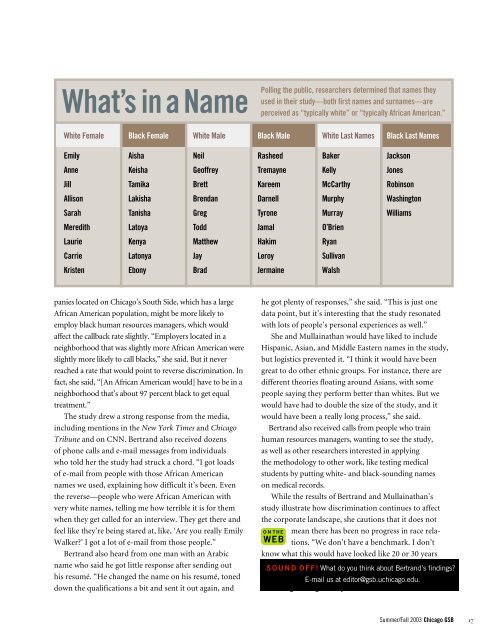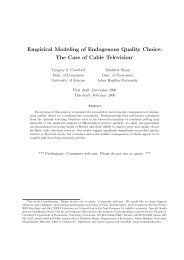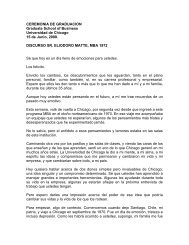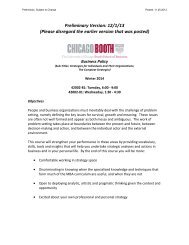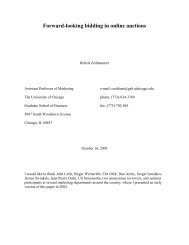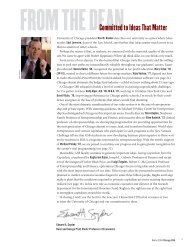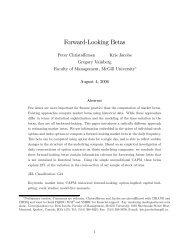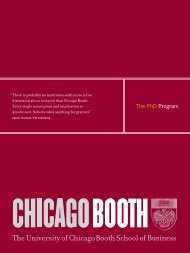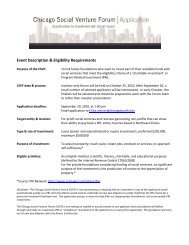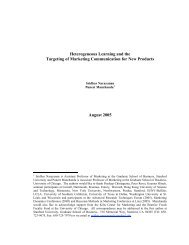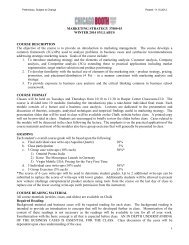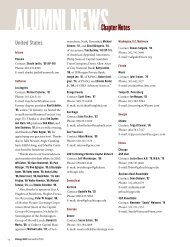Why Jamal Can't Get a Job - The University of Chicago Booth ...
Why Jamal Can't Get a Job - The University of Chicago Booth ...
Why Jamal Can't Get a Job - The University of Chicago Booth ...
- No tags were found...
Create successful ePaper yourself
Turn your PDF publications into a flip-book with our unique Google optimized e-Paper software.
What’s in a NamePolling the public, researchers determined that names theyused in their study—both first names and surnames—areperceived as “typically white” or “typically African American.”White FemaleBlack FemaleWhite MaleBlack MaleWhite Last NamesBlack Last NamesEmilyAishaNeilRasheedBakerJacksonAnneKeishaGe<strong>of</strong>freyTremayneKellyJonesJillTamikaBrettKareemMcCarthyRobinsonAllisonLakishaBrendanDarnellMurphyWashingtonSarahTanishaGregTyroneMurrayWilliamsMeredithLatoyaTodd<strong>Jamal</strong>O’BrienLaurieKenyaMatthewHakimRyanCarrieLatonyaJayLeroySullivanKristenEbonyBradJermaineWalshpanies located on <strong>Chicago</strong>’s South Side, which has a largeAfrican American population, might be more likely toemploy black human resources managers, which wouldaffect the callback rate slightly. “Employers located in aneighborhood that was slightly more African American wereslightly more likely to call blacks,” she said. But it neverreached a rate that would point to reverse discrimination. Infact, she said, “[An African American would] have to be in aneighborhood that’s about 97 percent black to get equaltreatment.”<strong>The</strong> study drew a strong response from the media,including mentions in the New York Times and <strong>Chicago</strong>Tribune and on CNN. Bertrand also received dozens<strong>of</strong> phone calls and e-mail messages from individualswho told her the study had struck a chord. “I got loads<strong>of</strong> e-mail from people with those African Americannames we used, explaining how difficult it’s been. Eventhe reverse—people who were African American withvery white names, telling me how terrible it is for themwhen they get called for an interview. <strong>The</strong>y get there andfeel like they’re being stared at, like, ‘Are you really EmilyWalker?’ I got a lot <strong>of</strong> e-mail from those people.”Bertrand also heard from one man with an Arabicname who said he got little response after sending outhis resumé. “He changed the name on his resumé, toneddown the qualifications a bit and sent it out again, andhe got plenty <strong>of</strong> responses,” she said. “This is just onedata point, but it’s interesting that the study resonatedwith lots <strong>of</strong> people’s personal experiences as well.”She and Mullainathan would have liked to includeHispanic, Asian, and Middle Eastern names in the study,but logistics prevented it. “I think it would have beengreat to do other ethnic groups. For instance, there aredifferent theories floating around Asians, with somepeople saying they perform better than whites. But wewould have had to double the size <strong>of</strong> the study, and itwould have been a really long process,” she said.Bertrand also received calls from people who trainhuman resources managers, wanting to see the study,as well as other researchers interested in applyingthe methodology to other work, like testing medicalstudents by putting white- and black-sounding nameson medical records.While the results <strong>of</strong> Bertrand and Mullainathan’sstudy illustrate how discrimination continues to affectthe corporate landscape, she cautions that it does notmean there has been no progress in race relations.“We don’t have a benchmark. I don’tknow what this would have looked like 20 or 30 yearsago.” SOUND ■ OFF!What do you think about Bertrand’s findings?For more on Bertrand’s E-mail us research, at editor@gsb.uchicago.edu.visit gsbwww.uchicago.edu/news/gsbchicago/facultylinks.html.Summer/Fall 2003 <strong>Chicago</strong> GSB17


